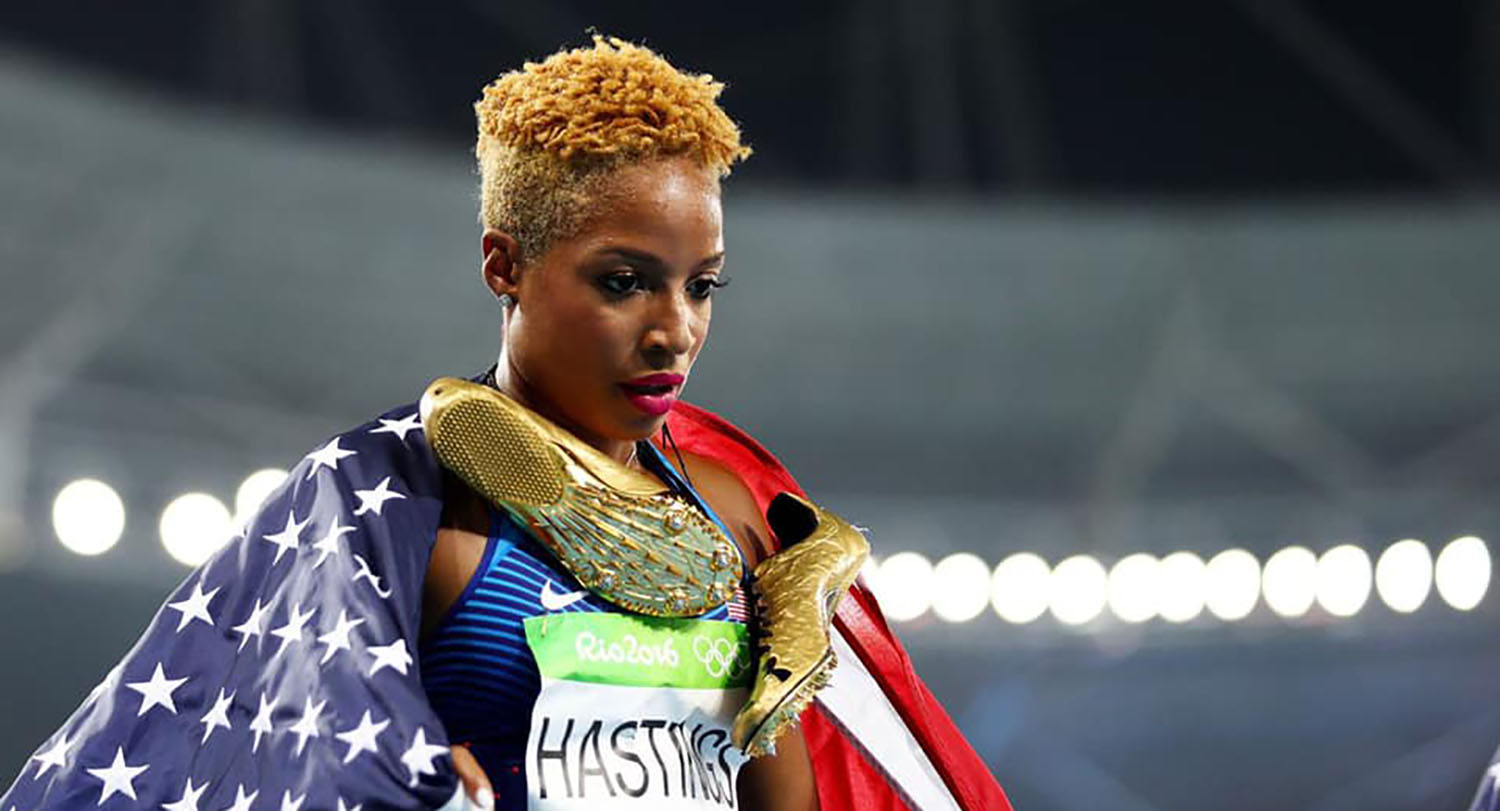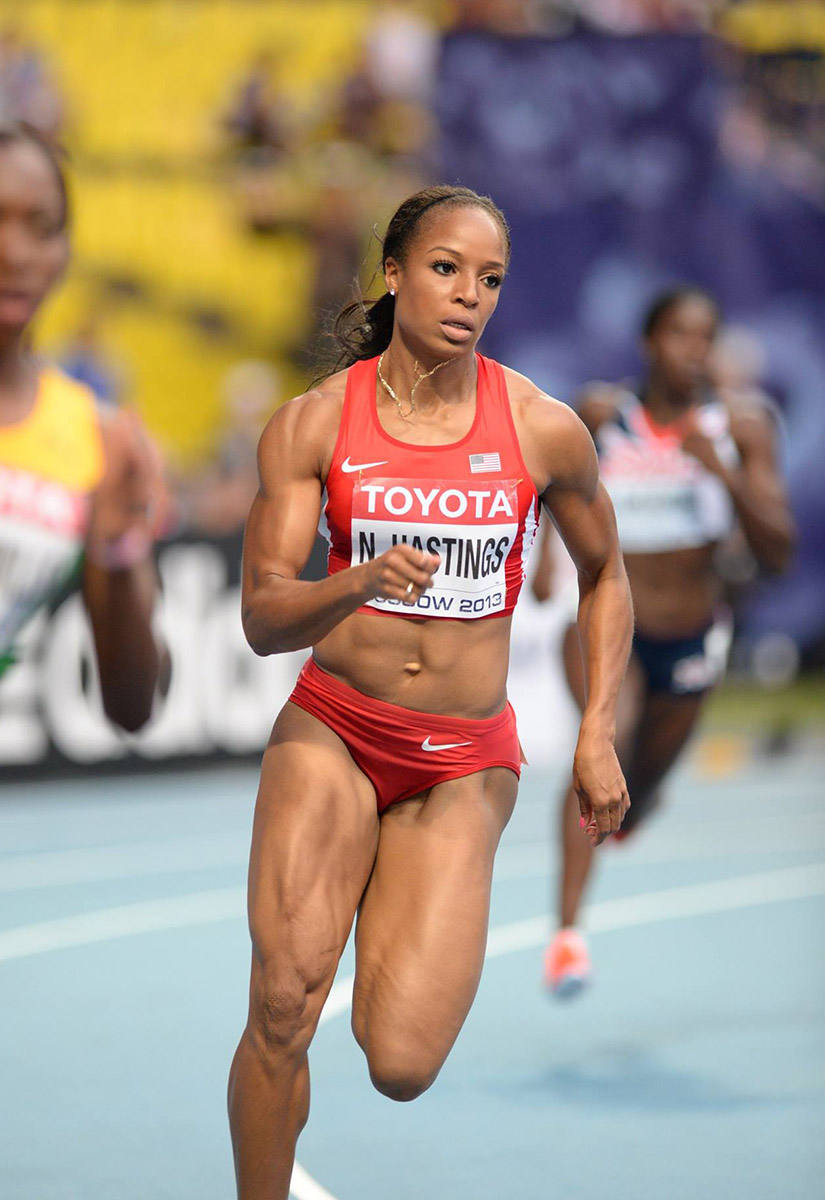
Natasha Hastings came to the University of South Carolina with dreams of excelling as an athlete. Although her talent eventually would propel her to an NCAA championship, multiple world championships and two Olympic gold medals, her initial start on the Gamecock track and field team was less than stellar. Her body was sound, but she had psychological demons to slay.
Her coach, Curtis Frye, referred her to Dr. Timothy Malone, psychiatrist and director of mental health in Gamecock Athletics, to help her get back on track. Frye’s intuition was spot on.
“Coach Frye said I need to talk to someone,” says Hastings. “Even though I only saw Dr. Malone a couple of times, his impact is still felt today. He gave me a book called, Mind Gym, and I still recommend and use that book.”
While a South Carolina Honors College student, Hastings balanced sports and classroom time, excelling in both. She was recognized as the 2007 SEC Scholar Athlete of the Year and the 2007 South Carolina Female Athlete of the Year.
Turning professional while still in college, Hastings won her first Olympic gold medal in the 4x400-meter relay event in the 2008 Beijing Olympics. Later that year, she graduated from USC’s Arnold School of Public Health with a bachelor’s in exercise science.
Lightbulb moment
After her success in China, Hastings disappointingly missed making the 2012 Olympic Trials, despite the effort she put in during training.
“My belief in myself was not what I needed to perform at my best,” says Hastings. “My performance was in no way a reflection of how hard I was working.”

Her mental training led to a lightbulb moment. By changing her internal voice on and off the track, Hastings found greater success and broader possibilities that would lead her back to USC.
“When I was a student-athlete and a freshman, a reporter asked me why I chose to work with Coach Frye and attend the University of South Carolina. I shared that Coach Frye had a history of working with quarter-milers, and it made sense because I am a quarter-miler. I added that the team was full of divas. From that interaction, ‘Gamecock Divas,’ was born.”
In an effort to identify as “the 440 Diva” moniker that followed and the strong confidence it implied, Hastings mentally focused on developing a positive inner and outer self-image. She developed a meditative pre-race ritual. While mindfully applying full makeup, she visualized success and worked through her mental gymnastics. She not only was determined to look her best but to perform her best.
Hastings continued to learn mental best practices from her psychologist so she could close the gap between her potential and her performance.
“In our very first session, my psychologist asked me what I say to myself when I am on the starting line,” says Hastings. “After reciting a list of negative things, he got really silent. He told me, ‘Natasha, you have lost the race before the gun has gone off.’”
Hastings began to transform her negative self-talk into positive affirmations, a simple practice that can be incredibly hard to do daily.
“Just like I go to the weight room and run on the track, I have to do the mental gym right,” says Hastings.
Another effective exercise was reconciling the possibility of failure with opportunities for growth. She began to visualize in detail what success looked like before getting to the track.
“The more I focus on what I actually have control over, the more I have an impact on what the outcome is,” says Hastings. “We have to let go of what we cannot change.”
As she continued to train for another Olympic bid, Hastings recalled a race on a very cold, rainy day. She had performed poorly at a previous race and was bracing for the possibility of a repeat disappointment. With miserable weather, she had to really focus on what she could do to perform her best.
It worked. Hastings won gold again in the 4x400 relay in Rio de Janeiro in 2016.
‘The sun is shining in lane 7’
“I kept saying to myself, ‘The sun is shining in lane 7,’” says Hastings. “I thought about how I wanted to move out of the blocks, how I wanted my feet to strike the ground and execute my race down the back stretch. Hip positions, arm drives, that was all I thought about in my warmup. …
“I was so focused that I tapped into my flow state, and I can’t really remember running at all. I crossed the finish line at my fastest time in six years. Three weeks later I would go on to win the U.S. Championships and equal my best time.”
My professors took time to really see me as a human, and that’s a practice I use when I work with students.
After the Covid pandemic postponed the 2020 Olympics in Tokyo, Hastings thought about using the extra time to attend graduate school. Hastings couldn’t say no when USC offered her a graduate assistantship position working with student athletes and financial assistance with her degree.
“I thought when I left undergrad, I would never come back to live in Columbia,” says Hastings. “I had my son and needed a village, but I made the move anyway. It was difficult because I was managing my internship, school, being a mom and still training. My professors took time to really see me as a human, and that’s a practice I use when I work with students.”
Grateful for the help she received from Coach Frye and Dr. Malone, Hastings never forgot how difficult it was later to find a relatable counselor who was both a woman and Black. This got her thinking about her post-athletic career, and she decided she wanted to pursue counseling as a profession.
Hastings completed her educational specialist in counselor education from the College of Education and now works with student athletes and teams at USC to provide the mental health services she found so critical.
“Every therapist has that something that led them to this role,” says Hastings. “My passion is women and girls in sports. Athletes tend to be viewed as superheroes, and if you say you are not OK, it can be frowned upon. I struggled to find a practitioner who looked like me.”
“In hindsight, I see so many moments in my life that led me to this moment. I am able to fill in the gaps for girls in the sport now.”